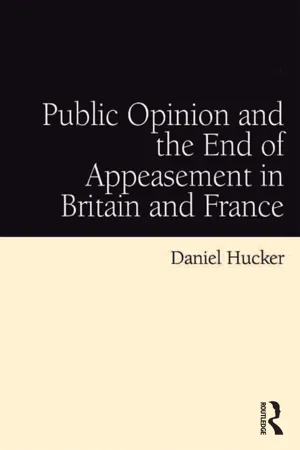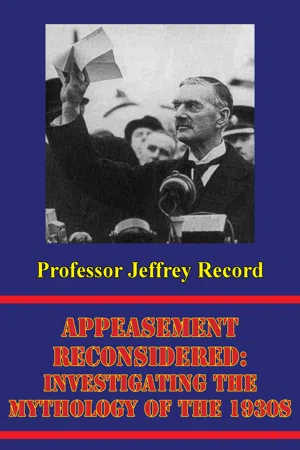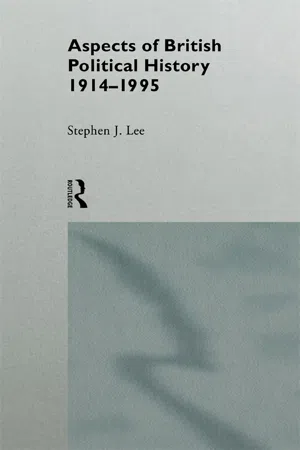Appeasement
Appeasement refers to the diplomatic strategy of making concessions to an aggressive power in order to avoid conflict. It gained prominence in the 1930s as European powers sought to appease Nazi Germany's expansionist ambitions. The policy is often criticized for failing to prevent World War II and allowing Hitler to strengthen his position.
5 Key excerpts on "Appeasement"
- eBook - ePub
Reading Hitler's Mind
The Intelligence Failure that led to WW2
- Norman Ridley(Author)
- 2022(Publication Date)
- Frontline Books(Publisher)
...Chapter 1 Appeasement and Strategic Deception Appease to pacify, quiet, or satisfy, especially by giving into the demands of; synonyms for the noun ‘Appeasement; amends, settlement, reparation, conciliation, compromise. Webster’s New World Dictionary and Thesaurus Appeasement (definitions) the policy of reducing tensions with one’s adversary by removing the causes of conflict and disagreement. Stephen Rock the reduction of tension between [two states] by the methodical removal of the principal causes of conflict and disagreement between them. Gordon Craig the policy of settling international … quarrels by admitting and satisfying grievances through rational negotiation and compromise, thereby avoiding the resort to an armed conflict which would be expensive, bloody, and possibly very dangerous. Paul Kennedy It is almost impossible to overestimate the way in which memories of the slaughter of the First World War influenced official and public opinion in Europe during the 1920s and 1930s. For those like Neville Chamberlain, who became Prime Minister in 1937 there was a simple inability to imagine that any European statesman, even Hitler, could or would wish to risk a repetition of the Great War. Hitler, however, proved to be some way beyond anything dreamed of in Chamberlain’s philosophy. A racial Darwinist with territorial ambitions, Hitler saw the First World War not in terms of the numbers dead but purely as a humiliation of Germany which demanded retribution. To achieve this he had warped his country’s cultural heritage into a militaristic leviathan which he was eager to employ through tactical opportunism in a bold bid to realise his strategic vision. His ideological rantings on race and lebensraum were not taken seriously even in Germany by high-ranking officials such as Hjalmar Schacht, whose traditional conservatism had initially welcomed a strong leader to stabilise the country after Weimar...
- eBook - ePub
- Gordon Martel, Gordon Martel(Authors)
- 2002(Publication Date)
- Routledge(Publisher)
...Some scholars have seen it as a natural and rational strategy in the light of Britain’s weaknesses in the world by the 1930s. Others have pointed out that it was, albeit in a more intensified form, a normal continuation of the British diplomatic tradition of attempting to settle disputes peacefully. Appeasement was, in fact, all of the above, and needs to be understood as such. It also needs to be investigated at different levels of causality, so that distinctions can be made between the nebulous, sometimes confused mentality of the appeasers on the one hand, and the cluster of military or economic or imperial or domestic–political motives which justified, or seemed to justify, concessions to the dictators on the other. Only when it is approached in such a way will the historians rise above simplistic one dimensional descriptions, and deal with Appeasement as the complex, variegated, shifting phenomenon which it really was. This essay, then, closes with a call for further work on Appeasement. Taylor’s book, together with the opening of official and private archives, provoked and inspired a flood of scholarship on British policy in the 1930s. Although the tide has ebbed, it should be clear that many subjects remain inadequately explored. One can hope that the recognition of Appeasement’s complex nature will spur scholars to examine all aspects of British policy before the Second World War. Notes 1 This essay is concerned with the text of the original (1961) edition of Taylor’s The Origins of the Second World War, and not with the “Second thoughts” Foreword of the 1963 edition, nor with either “War origins again,” Past & Present, no. 30, 1965, or “1939 revisited,” the 1981 Annual Lecture of the German Historical Institute, London. 2 Intelligence records remain a notable exception, and thus far only official historians have gained access to them. See F. H. Hinsley et al., British Intelligence in the Second World War: Its Influence on Strategy and Operations, vol...
- Daniel Hucker(Author)
- 2016(Publication Date)
- Routledge(Publisher)
...In essence, ‘Appeasement’ was the ‘Munich policy’, a term used widely on both sides of the Channel. Hence it is this interpretation of Appeasement that will be used throughout this study. Whatever one’s chosen definition, the very word ‘Appeasement’ resonates with meaning. Largely negative and ignominiously symbolic, it retains a ‘mythic status as a foreign policy of catastrophic failure’, evoking the infamous Munich agreement and Chamberlain’s notorious claim of ‘peace in our time’. 7 Within the discourse of contemporary international relations, Munich remains a dirty word, synonymous with diplomatic weakness, self-delusion and failure. 8 Little has changed since the early days of the war, when the fervent backlash against the appeasers was first articulated. The 1940 publication, Guilty Men, castigated the British governments of the 1930s for capitulating to a dictatorial megalomaniac intent on world war...
- Professor Jeffrey Record(Author)
- 2014(Publication Date)
- Lucknow Books(Publisher)
...Before Munich, however, observes historian Paul Kennedy, “the policy of settling international. . . quarrels by admitting and satisfying grievances through rational negotiation and compromise, thereby avoiding the resort to an armed conflict which would be expensive, bloody, and possibly very dangerous” was generally viewed as “constructive, positive, and honorable.” {28} Even after World War II, Winston Churchill, the great anti-appeaser of Hitler, declared that Appeasement could be (if driven from a position of strength as opposed to weakness) “magnanimous and noble,” and perhaps “the surest and only path to world peace.” But the success or failure of Appeasement depends on more than whether the appeasing state is dealing from a position of strength or weakness. Much depends on the nature and objectives of the state toward which Appeasement is directed. A state bent on war or possessing territorial or ideological objectives that cannot be satisfied short of war is most unlikely to be appeasable (though it may be deterrable); conversely, a state seeking to avoid war and having limited objectives whose satisfaction does not threaten core security interests of the appeasing state is likely to be appeasable. An oft-cited case of successful Appeasement was Britain’s Appeasement of the United States from 1896 to 1903. {29} By the 1890s, the number and power of Britain’s potential enemies were growing. Britain had no great power allies and faced rising imperial challenges from Germany and Russia, on top of continuing traditional tensions with France and the United States. Tensions with an industrially expanding Germany became especially acute when Berlin in 1898 decided to challenge British naval supremacy in European waters...
- eBook - ePub
- Stephen J. Lee(Author)
- 2005(Publication Date)
- Routledge(Publisher)
...10 FOREIGN POLICY AND Appeasement 1933–9 The politicians most directly associated with Appeasement were the three prime ministers of the 1930s: Ramsay MacDonald (1929–35), Stanley Baldwin (1935–7) and Neville Chamberlain (1937–40), along with their Foreign Secretaries: Sir John Simon (1931–5), Sir Samuel Hoare (1935), and Lord Halifax (1938–40). This chapter will consider the origins of Appeasement as deliberate policy and its applications over Italy, Spain and Germany. The main emphasis will be on detailed examination of the controversial policy of Chamberlain between the Munich settlement of September 1938 and the declaration of war on Germany twelve months later. THE ORIGINS OF Appeasement It is tempting to think of Appeasement as a policy which originated in the 1930s as a response to the military threat posed by the dictatorships, and as a replacement for the earlier ‘stand firm’ policy embodied in collective security. This end-on chronological view of collective security and Appeasement is, however, simplistic. There was, rather, an overlap between the two. Collective security had never, for Britain, been a total commitment and there had always been reservations and loopholes which might be seen as incipient Appeasement. These reservations rapidly increased during the 1930s. Appeasement did not, therefore, suddenly appear as an alternative to collective security. It coexisted with collective security, grew out of it and eventually replaced it. There had always been an undercurrent of Appeasement in Britain, stemming from the First World War, during which the Union of Democratic Control (UDC) had been established. Comprising a number of MPs and others from the Labour and Liberal parties, this played some part in preparing the British public to accept the policy of Appeasement. But it had little direct impact on the actual formation of that policy...




